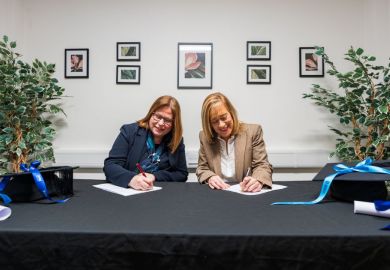SOAS University of London’s director warned that without action the institution would “exhaust [its] cash reserves” within two years then continue to “haemorrhage cash”, going £19 million into the red, while the institution’s trustees discussed “how they would have assurance that the school was sustainable for the next three years”.
SOAS said that since those warnings on cash flow late last year, produced “solely to illustrate” that the status quo “was clearly not a sustainable stance”, it has taken “concerted action” to reduce costs and grow income.
The warnings emerged as figures on Ucas acceptances suggested that the school’s intake of new undergraduates has fallen by 37 per cent in just two years.
SOAS, which describes itself as the world’s leading institution for the study of Asia, Africa and the Middle East, went from 1,170 Ucas acceptances in 2016 to 735 in 2018.
While the school had a strategy to shrink, there are suggestions that numbers have plummeted quicker than expected.
The warning from SOAS that it could run out of cash without action amounts to one of the most dramatic expressions of concern yet about a university’s finances.
Baroness Amos, the Labour peer and former minister, has been SOAS director since 2015. A report she wrote for the November meeting of the SOAS board of trustees, alongside deputy chief operating officer Graeme Appleby, cited the “intensification of the competitive environment between universities” and “declining undergraduate student recruitment” among the factors behind financial problems.
The board papers state that “enhanced monitoring arrangements” were “imposed” by the Office for Students on SOAS “due to its weak operating cash flow”. SOAS is among 194 higher education providers subjected to such enhanced monitoring by the OfS.
Baroness Amos’ report also said: “Should no further action be taken to improve our cash flow we are projected to exhaust our cash reserves during 2020-21, ending the year £1.9 million overdrawn, and are expected to continue to haemorrhage cash in the years thereafter.”
The report gives a projected cash deficit of £18.5 million for 2022-23.
Minutes from the meeting state that the board “discussed the implications of the school’s financial challenges and that jobs were at risk”. The minutes also state: “The board discussed how they would have assurance that the school was sustainable for the next three years to support their current students.”
SOAS returned a £1.2 million deficit in its 2017-18 accounts.
A SOAS spokeswoman said: “The external environment for UK higher education institutions is a challenging one, especially for relatively small and specialist institutions like SOAS.
“The declining population of 18-year-olds, declining real value of regulated fees, uncertainty surrounding future regulated fee level, uncertainty surrounding Brexit and pressure of staff costs as a consequence of increasing employer pension contributions are creating challenging conditions for the university sector.”
On action taken, the spokeswoman cited “new transnational education partnerships and foundation year programmes”, as well as “successfully delivering change through our One Professional Services programme to reduce costs and focus on improving services to our students”.
On recruitment, the spokeswoman said that the institution “knew that the strategic decision to hold our tariff would have a short-term impact on intake numbers” but that it had “already had a positive impact on our league table standing”.
“We continue to target growth in student numbers while holding our [undergraduate] tariff at current levels. Our acceptances at [undergraduate] level for 2019-20 are currently running at 20 per cent higher than at the same time last year for both home/EU and overseas students,” the spokeswoman said.
Register to continue
Why register?
- Registration is free and only takes a moment
- Once registered, you can read 3 articles a month
- Sign up for our newsletter
Subscribe
Or subscribe for unlimited access to:
- Unlimited access to news, views, insights & reviews
- Digital editions
- Digital access to THE’s university and college rankings analysis
Already registered or a current subscriber?








